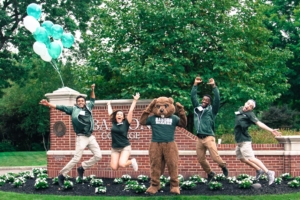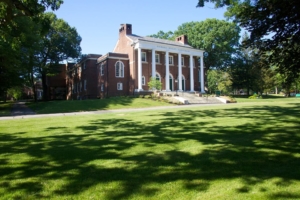EVERYTHING’S NOT JUST BLACK AND WHITE
Still, the pressing issue of diversity isn’t merely a matter of black and white.
The school reports the impact can sometimes be seen among Asian American students as they don’t always know where they fit into these conversations as they’re happening. Meanwhile, many Latin American students were outspoken and voiced their frustrations on conversations surrounding the controversial Dreamer’s Act or DACA (Deferred Action for Childhood Arrivals).
“I’m always trying to remind myself of broadening the conversation and remembering where the intersection comes in in terms of gender, etcetera,” says Anderson.
To this end, in its effort to be holistic, Babson is hitting diversity on all cylinders. Everything from gender, international diversity, sexual orientation, socioeconomic status, and more. For instance, through seminars, talks, and other initiatives, aiding international students who sometimes have no understanding of the historical precedence of the systemic diversity issues at hand.
“Is it just a black and white issue? Certainly race is a significant context to have this conversation, but we’ve been trying to bring in other types of voices,” Reza says. “Bringing topics related to socioeconomic status and faith into the conversation has been a part of our efforts as well. Those are the ways that we try to broaden it so it’s not just black and white. However, we’re not going to ignore it when it’s happening in U.S. and current events. We’re going to spend time talking about Black Lives Matter and other things related to race.”
GLIMMERS OF HOPE
Babson and its students readily admit that the road ahead of getting to where they hope to be on these issues is long and uncertain. Yet, there are elements that offer promising glimmers of hope.
There’s the faculty member who used to be uncomfortable and afraid to hold conversations about these issues in class, but now displays a willingness to take risks. So much so that now she can’t stop talking about them with her students.
There’s the student from Belarus who came to Babson and, from a Critical Race Theories course, has become a champion among her peers in helping to initiate and lead these important conversations.
Then there’s “Diversity Matters,” a monthly program where faculty and staff come together around a particular topic, are open and honest about institutional shortcomings, and discuss ways to do more and to do better. Topics have ranged from “Black Lives Matter vs. All Lives Matter” and “Islamophobia through Different Lenses/Experiences” to “Growing Equity in the Classroom” and “Difficult Conversations in Response to Critical Incidents” plus much more in between.
“You see the needle move at least a little bit in people having more curiosity,” Reza tells Poets&Quants.
BREAK
Some of the other formal initiatives, programs, and events put in place by the school include the Babson Womyn of Color Group that “provides a brave space for womyn of color to share ideas and discuss issues, concerns, and challenges in a supportive and relaxed setting.” Topics explored include racism and micro-aggressions experienced at Babson, body image and hair, sexuality, and healthy relationships.
Race & Racism is a three-part series that educates and provides context for international students about race issues in the U.S. During undergraduate orientation and a first year seminar for new students, some of the required courses that are built in include classes on privilege and micro-aggressions, intercultural sensitivity, identity, bias, and stereotypes.
From a student perspective, Mendes says that before she graduated, it always gave her hope when criticism from students was met with openness and a genuine desire to find out how to strive for better. “One thing I do admire is the climate at Babson is one of openness,” she says. “When we wanted to raise an issue, they’d say, ‘You want to meet with the provost? Ok, sure.’ The school is open to the criticism, they’re hearing it, and they want to do something about it.”
Reza poses several questions. “Are we being honest with ourselves as a society? Are we? I think not in many ways. We’re not taking these issues seriously, and that spills over. We’re a microcosm of our environment. Each year, we have a new cohort of students who have been socialized, parented, etc. and we place them in a new context. These things don’t stop at the gates just because we have a policy at Babson or we try to be honest with ourselves.
“Does everyone at Babson feel the way that I do about these issues or are they engaging with it on a daily basis? I can’t guarantee that they are because they have their own reality. But, what role do we play as educators? You raise awareness and maybe some empathy for others that will hopefully negate some of the ‘isms’ over the course of time.”
DON’T MISS: B-SCHOOLS THAT ENROLL THE MOST MINORITIES and HOW MICHIGAN ROSS PLANS TO TURN AROUND ITS DIVERSITY NUMBERS












